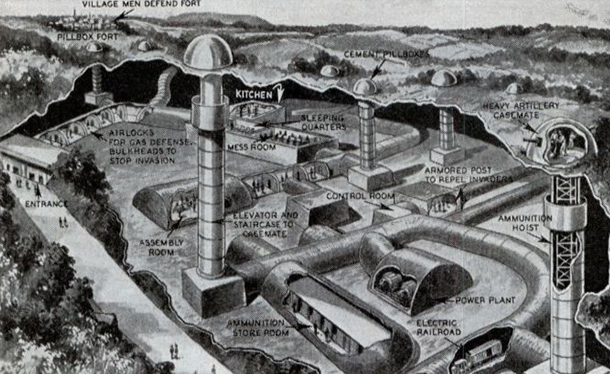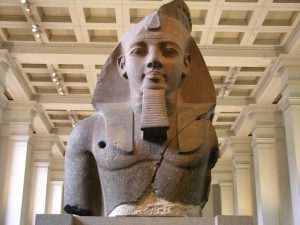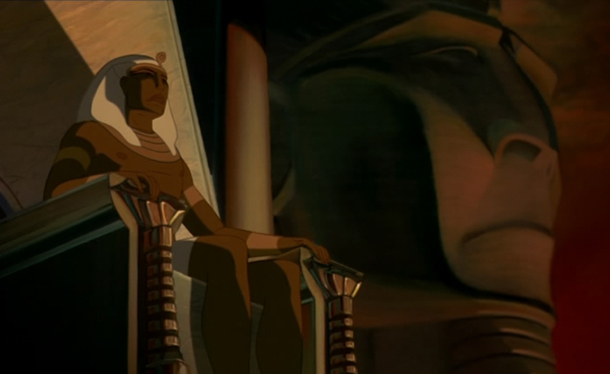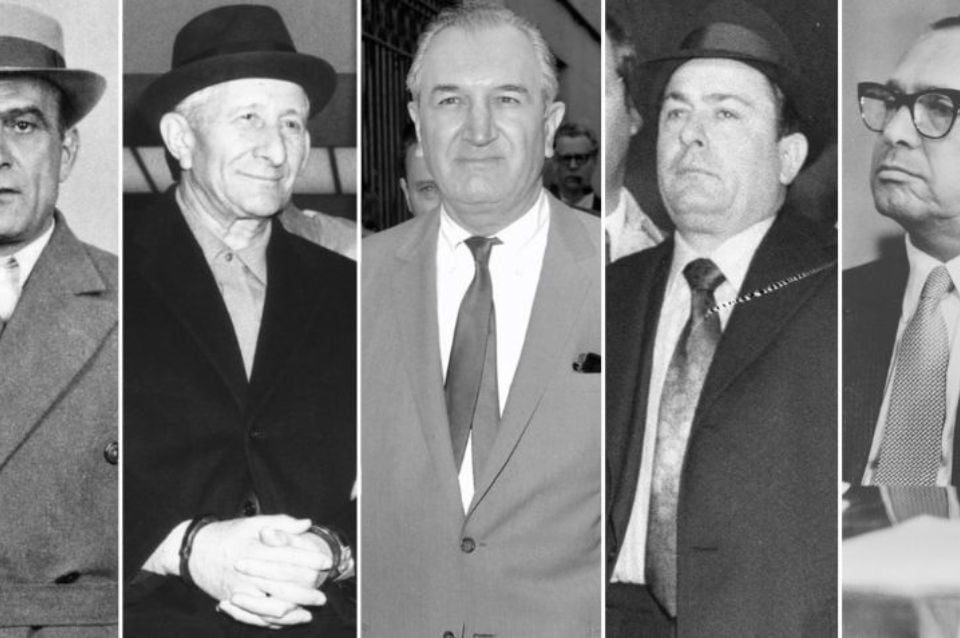
WWII – THE MAGINOT LINE (France)
April 4, 2013
IVAN the TERRIBLE (nuff said…)
June 6, 20131303-1213 BCE : Ramses II – Pharaoh of Egypt
When it comes to researching Ancient Egyptian history, much has been lost to the sands of time, but one man’s legacy left a mark like no other. The Pharaohs were considered by the Ancient Egyptians to be the Gods on Earth – a reincarnation of Ra, Horus or Osiris. They ruled the region of the Nile as both political and religious leaders who wore more eyeliner than Keith Richards and Ozzy Osborne combined.
Over Three-Thousand-Years ago, during the height of the ‘New’ Kingdom’s Nineteenth Dynasty, a ruler by the name of Ramses rose to power: Ramesses the Second, Pharaoh of Egypt, self-proclaimed God-King, and lying two-faced politician who based his entire campaign on a laundry list of fabrications…

Ramses II ruled Egypt at its height, and some believe him to be the greatest of the Pharaohs, but I guess it’s all relative, especially considering he built his empire on the backs of slaves, and lies. (Technically, I guess you could also make a case for Stalin being a benign ruler, but that might actually say more about you.) Like Alexander the Great, Ramses II did everything humanly possible to make sure that no one would ever forget his name, no matter what, including but not limited to, making shit up.
I get the feeling that part of this motivation came from his grandfather, Ramses the First, who lasted only 17 months in the throne. Perhaps Ramses the Second felt the need to prove something of his somewhat tarnished title. Seti I on the other hand, (the son of Ramses I, and the father of Ramses II) is credited with helping to establish an era of prosperity for the people of Egypt. When Ramses Junior inherited the position, he decided to one-up his old man, in every conceivable way.
Instead he wound up paving the way for Egypt’s downfall.
Ozymandias: King of Kings
Ramses II, Ramesses, or Ramses ‘The Great’, was also known as ‘Ozymandias’ a moniker attributed to author Percy Bysshe Shelley’s poem, from 1818. Percy was the husband of Mary Shelley, the famous author of “Frankenstein: The Modern Prometheus”, and friend of Lord Byron.
 The poem goes as follows…
The poem goes as follows…
I met a traveller from an antique land who said: “Two vast and trunkless legs of stone stand in the desert. Near them on the sand, half-sunk, a shattered visage lies, whose frown and wrinkled lip and sneer of cold command tell that its sculptor well those passions read which yet survive, stamped on these lifeless things, the hand that mocked them and the heart that fed. And on the pedestal these words appear: ‘My name is Ozymandias, king of kings: Look on my works, ye mighty, and despair!’ Nothing beside remains. Round the decay of that colossal wreck, boundless and bare, the lone and level sands stretch far away.”
Ramses the Great was one of the longest-reigning rulers of Egypt, with a record-shattering 66 years in office. He first came to power in his early 20’s and died of natural causes at the ripe age of 90, which is mind-blowingly incredible if you consider the average life span at the time was 30.
 In fact Ramesses outlived 12 of his potential heirs to the throne – yep, Twelve of his sons. This guy was truly ancient by ancient Egyptian standards, which added credence to his immortal god-hooded-ness. Ramses also managed to knock up literally hundreds of babes in his free time. He sired over a hundred children with 200 wives! If an extensive harem of hotties wasn’t enough to satiate his bottomless desire, his wife, Nefertiti was so beautiful that the Egyptian Priesthood worshiped her as the living embodiment of Isis, the goddess of love.
In fact Ramesses outlived 12 of his potential heirs to the throne – yep, Twelve of his sons. This guy was truly ancient by ancient Egyptian standards, which added credence to his immortal god-hooded-ness. Ramses also managed to knock up literally hundreds of babes in his free time. He sired over a hundred children with 200 wives! If an extensive harem of hotties wasn’t enough to satiate his bottomless desire, his wife, Nefertiti was so beautiful that the Egyptian Priesthood worshiped her as the living embodiment of Isis, the goddess of love.
All in all, any way you look at it: Ramses was a pompous prick. This sand-trotting bastard left behind more statues of himself than ANY other person in the history of the world. He was obsessed with outshining all those who came before him, and ensuring that he would tower over all those who would follow. Ramses was one of the first rulers to take on the title of ‘The Great’, before it was cool. (Take that Alexander!)

From left to right: Ramses II, Ramses II (minus head), Ramses II, and Ramses II…
If that wasn’t enough evidence of an over-sized ego, Ramses II also named not just one, but multiple cities after himself, the most famous of which, Pi-Ramesses, roughly translates as ‘House of Ramses, Great in Victory’. This ego-maniac even dedicated an entire museum to himself, the Ramesseum (I know it sounds like I made that up, but I didn’t… trust me, I wish I had.)
He also had a compulsion to re-write history, and take credit for the works of other Pharaohs before him, even going as far as crossing out their names and replacing his own. In addition to countless larger-than-life stone replicas of himself, Ramses also had the largest Egyptian statue ever conceived erected in his image. Ironically, all that is left intact of ‘The Colossus of Ramesses’, is its feet. In fact it was the imagery of this decimated statue inspired Shelley’s Ozymandias poem.
Ramses the Second was a ruthless military leader who led his troops into battle and didn’t even know the meaning of the term mercy. He also took credit for everything. Ramses the Great didn’t just dominate rival cultures and nearby villages, he would enslave their people, and during victory celebrations he ordered the right hands and penises of all his defeated enemies hacked off and heaped into a disgusting pile as a display of sheer dickery (pun-intended). Guy was a bastard, plain and simple.
The Battle of Kadesh
 Rameses’s goal in life was simple: to rule the world, and leave behind an empire that would last forever.
Rameses’s goal in life was simple: to rule the world, and leave behind an empire that would last forever.
I guess if you’re going to set yourself up to fail, might as well make it an epic attempt. Besides plastering his name all over the place like an annoying juvenile delinquent with a spray can, Ramses II often boasted of his military might – which is extremely ironic when you learn that his greatest victory was in fact his absolute worst defeat.
Kadesh (modern-day Syria) was the site of a series of conflicts between the Egyptians and the Hittites that took place over a twenty year period. During Ramses’ second military campaign into Hittite territory, the Pharaoh was forced to retreat, he crashed his chariot into one of his own divisions, and became surrounded by enemies. He barely escaped with his life. Ramses was later forced to sign a Peace Treaty with the Hittites.
Kadesh was a potential PR nightmare for Ramses (the Great), so he decided to spin it. Back home, he ordered the carving of gigantic reliefs commemorating his heroic ‘victory’ over the Hittites at the Battle of Kadesh, single-handedly.
The very first recorded form of propaganda.

An ancient Egyptian political ad.
As I mentioned, Ramses Jr. had a tendency to rewrite history. Speaking of…
The Pharaoh of The EXODUS?!

Moses to Ramses: “Come at me bro!”
The historical Pharaoh, Ramses II, is often cited by scholars as the most likely suspect for the role of the Egyptian despot referred to in the Biblical story of the Hebrew Exodus from Egypt to the land of Canaan. However, the evidence that there is any factual truth to the morality tale of Moses and the Ten Commandments / Plagues is minimal at best. Spiritual beliefs aside, if anything resembling the events of Exodus indeed occurred, this may have been the time period in which they took place. Plus, if Ramses really was in power during a full-scale Jewish revolt / slave uprising / mass exodus, then there’s also reason to believe that Ramses wouldn’t hesitate to eradicate any trace of evidence, seeing as he was known for doing so on other occasions.
 Exodus recounts the tale of Moses, whom as a baby was sent away in a basket on the river Nile, in an attempt to spare his life. As fate would have it, the Princess (Nefertiti?) discovers the boy, and convinces her father (hubby?) to raise him as one of their own, so the Pharaoh (Seti?) adopts the boy who grows up as the Prince of Egypt.
Exodus recounts the tale of Moses, whom as a baby was sent away in a basket on the river Nile, in an attempt to spare his life. As fate would have it, the Princess (Nefertiti?) discovers the boy, and convinces her father (hubby?) to raise him as one of their own, so the Pharaoh (Seti?) adopts the boy who grows up as the Prince of Egypt.
Then one day, like Kal-El of Krypton, Moses of Israel discovers his backstory and realizes his destiny. Moses then straight-up murders one of the slave drivers for harassing one of his homies. Moses flees Egypt and runs into a burning bush that tells him its the voice of God. Moses takes the bush’s word for it, because it’s a talking burning bush. Older, bearded Moses then goes back to Egypt, from his desert exile, with a mission from the man upstairs and tells ‘Ramses’ (?) “Let my people go!” After the Egyptian tyrant stops laughing he realizes Moses means business, but doesn’t give in.
Eventually it takes Ten deity-sent plagues for the Egyptian ruler to get the message, and free the Jews. However, ‘Ramses’ waits until the Hebrews began their journey before he changes his mind and decides to lead his forces after the defenseless ex-slaves. Moses and his peeps are backed up against a waterway (and none of them can swim), so Moses uses his God-powered staff to magically part the Red Sea.
Once they settle in the ‘Promised Land’, the Hebrews rejoice while Moses heads up to a mountain where he is allegedly given the two tablets inscribed with The Ten Commandments (a grocery list of ‘Thou Shalt Nots’). Upon returning from the mountaintop, Moses sees that the Hebrews are already partying up a storm after being gone for like five minutes. Moses has a tantrum, rages out, and destroys the stone instructions (Moses Smash!).
 Now just because events may not have happened literally the way they were written, that doesn’t mean they weren’t in part based on truth. Metaphor used to be the way in which stories were told (and often times still are). For instance, the Plagues can be interpreted figuratively. The death of livestock, and invasion of locusts could symbolize economic downturn, the Nile running red might mean rampant crime and murder rates, while the darkness and fire from heaven could be foreshadowing of future decimation at the hands of a crappy ruler.
Now just because events may not have happened literally the way they were written, that doesn’t mean they weren’t in part based on truth. Metaphor used to be the way in which stories were told (and often times still are). For instance, the Plagues can be interpreted figuratively. The death of livestock, and invasion of locusts could symbolize economic downturn, the Nile running red might mean rampant crime and murder rates, while the darkness and fire from heaven could be foreshadowing of future decimation at the hands of a crappy ruler.
There’s an underwhelming lack of evidence connecting Ramses to the events of the Hebrew Exodus, however there are some clues that have since been uncovered from the unforgiving sands of the Sahara. For instance, Ramses’s first born son died at a young age. This of course doesn’t mean that God struck him down, but whose to say the Hebrews didn’t assign meaning to events after the fact? For all we know they could’ve just rounded the ‘plagues’ to Ten and called it a day.
Although most historians are skeptical that the Ten Plagues described in the Biblical text ever actually occurred, there is one particularly interesting document found from this period. A papyrus scroll written by a native Egyptian, Ipuwer, describes a plague throughout the lands and the sea running red with blood, which seems to add credence to the Biblical tale. But perhaps things didn’t exactly play out as they did in the story.
Some scientists believe if the plagues actually took place, they may have been interrelated natural phenomenon. For instance, toxic fresh water algae could’ve turned the water blood red if the Nile dried up, leading to an influx in frogs and dead crops, leading to dead live stock, leading to locusts which lead to boils (through diseases like malaria), while fire and darkness could’ve been the result of a volcanic explosion, triggering all of the above.

If Ramses II really was the Pharaoh of the Exodus, then you can add another sixty reasons to his resume for supreme jackass status.
The Legacy of RAMSES II
Ramses II outlived all of his sons, and eventually died of natural causes. From what archaeologists have been able to ascertain from his mummified remains, he either had a heart attack, or died of an infected tooth (FAIL). He was buried in the Valley of Kings at Luxor (not to be confused with the hotel and casino in Vegas). Ten separate Egyptian rulers would go on to call themselves Ramses in a failed attempt to capitalize on his fame.
 As for Moses, he supposedly went on to write the first five books of the Bible, or the Torah which was later translated into the Old Testament (kinda funny considering he writes about his own death, and events that occurred long after it). The King James version of the Bible was the first book to become widely distributed throughout the Middle Ages thanks to Martin Luther’s protestant reformation. The Holy Book later went on to become a worldwide best seller, translated into ever language, and reprinted several times over the ages, which if you think about it kinda sucks for Moses, seeing as he never got a cent in royalties.
As for Moses, he supposedly went on to write the first five books of the Bible, or the Torah which was later translated into the Old Testament (kinda funny considering he writes about his own death, and events that occurred long after it). The King James version of the Bible was the first book to become widely distributed throughout the Middle Ages thanks to Martin Luther’s protestant reformation. The Holy Book later went on to become a worldwide best seller, translated into ever language, and reprinted several times over the ages, which if you think about it kinda sucks for Moses, seeing as he never got a cent in royalties.
Unlike previous Egyptian Pharaohs like Thutmose III who left behind a more prosperous kingdom than ever before, it was the fallout of Ramses II’s rule that specifically led to the irreversible decline of the Egyptian Empire. In an attempt to build an everlasting legacy, the only tangible thing that Ramses left behind were ruins.
I suppose nothing lasts forever…

“Look on my works, ye mighty, and despair!”
Erik Slader
Hope you enjoyed this edition of “Epik Fails!”, if you liked it be sure to ’Like’ Epik Fails of History on Facebook and SHARE IT with your friends! Also, if you have any questions, concerns, or suggestions say so in the comments below…
Cleopatra – Last Pharaoh of Egypt
Henry VIII and his Six Wives?!
————-Sources:
“Badass” by: Ben Thompson
“The Book of Ancient Bastards” by Brian Thronton
http://www.history.com/news/history-lists/11-things-you-may-not-know-about-ancient-egypt
http://www.starways.net/lisa/essays/exodus.html
http://www.eyelid.co.uk/Rameses2.html
http://www.nndb.com/people/174/000162685/
“Ramses II: Wrath of God or Man?” – History documentary
“Engineering Egypt” – History documentary
“The Exodus Decoded” – History documentary





20 Comments
[…] Eventually Horus manages to overthrow Set’s evil reign and restore order to the fertile lands of Egypt, well at least until the Romans came knocking… (Click Here for more on Egyptian History) […]
[…] —————–Click Here for RAMSES II […]
[…] Line, you may not have even heard of. In addition to brutal despots (such as: Emperor Nero, Ramses II, King John, and Ivan the Terrible), I’ll also be tackling historical icons / events that may […]
[…] RAMSES II – Or How to Rewrite History […]
[…] elsewhere on the site. (see previous articles: History of the Holidays, Creation Myths, Gilgamesh, Ramses II, Emperor Nero, and the Council of […]
[…] RAMSES II – How to rewrite History […]
[…] —Ramses II – How to Rewrite History […]
[…] RAMSES II (how to rewrite history) […]
Finally someone writes an article about Ramses I I that’s spot on. He was lying megalomaniac and a terrible military leader. The battles he won were against inferior opponents, with much smaller mitary. I enjoyed reading it and agree whole heartedly with you
What evidence is there that Akhenaten was assassinated?
Thanks for the response! I’ll be sure to look into that. Do you recommend any particular sources? I do apologize if I’m incorrect, it may have been an assumption / mix-up based on a college course I took a few years back.
I’ve only read sources that say there’s no information about Akhenaten’s end, other than that he probably died around September of his 17th regnal year. There’s no record of any uprising – in Philip Glass’s opera ‘Akhnaten’ he is deposed by the people in a riot, but that’s a bit of dramatic license. Good sources are ‘Akhenaten, Egypt’s False Prophet’ by Nicholas Reeves, and ‘The City of Akhenaten and Nefertiti’ by Barry Kemp. Kemp points out that books about Akhenaten tend to paint a negative picture of him (Reeve certainly does, and suggests there’s evidence of an assassination attempt) but that this is not really justified as their is so little hard evidence about the Amarna period. getting a sense of who’s who at the time is incredibly confusing!
[…] RAMSES II […]
It needs a marketing system and marketing knowledge
to be successful in any company opportunity.
They joined a company with practically no team support.
You may lose your focus (as happened with Trump when things went south) or drive.
Huh?
Haha this was fun to read, thanks
You’re most welcome! It’s one of my older articles, so glad to hear it still holds up. 🙂
Thanking the author for the fun read. Everything you wrote is true. A man that sold his soul and is still paying the debt, trying to reclaim it. Now being no one is sad for the ego he had, but empathy is learned that way. Have love and compassion for one to another. I wish you all well.
what the hell
a ruler eternal, now traversing the duat… reigning over himself and the mind,
guiding it all towards an end, definite
..
were u alive then? the hell…
thinking you know truth is dangerous: not one person holds the truth — and if He’s no one, then what the hell are you?
who si ‘someone’ for that matter…
god.
fun read.. but a tyrant of this calibre is no joke,
and i mean he was truly evil, i actually have seen
the merciless whipping in deep meditative states
he was a psychopath king to whom rules meant nothing
if they didn’t emanate from him, and those had to mean everything to everyone,
or else
but it was nice to see you emulate the despicableness
thanks